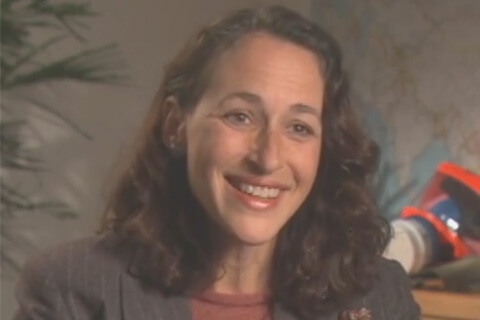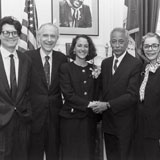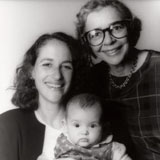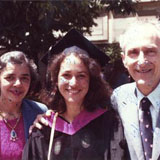Biography: Dr. Margaret Hamburg

Both my parents are physicians. I grew up right on the Stanford campus, surrounded by many friends and families that were related to the field of medicine... so it was always part of part of my experience. But because it was so much a part of my experience, I did have to go through the re-thinking: Is this something I really want to do, or was I just raised to think that of course I would be a doctor?
Margaret Hamburg, one of the youngest people ever elected to the Institute of Medicine (IoM, an affiliate of the National Academy of Sciences), is a highly regarded expert in community health and bio-defense, including preparedness for nuclear, biological, and chemical threats. As health commissioner for New York City from 1991 to 1997, she developed innovative programs for controlling the spread of tuberculosis and HIV/AIDS.
Margaret Hamburg is the daughter of Beatrix and David Hamburg, both distinguished physicians and early role models for her career in medicine. Her mother was the first African-American woman to attend Vassar College and to earn a degree from the Yale University School of Medicine (which had previously excluded black students). Her Jewish father and grandmother taught her to value education and family and to fight discrimination and oppression.
When she was inducted into the prestigious Institute of Medicine in 1994, she had followed the path of her parents, both IoM members since the 1970s. "There was a sense of real fun that the father-mother-daughter constellation had been formed," said Hamburg.
Hamburg is a graduate of Radcliffe College. She earned her M.D. from Harvard Medical School, and completed her training at the New York Hospital/Cornell University Medical Center. She did research in neuroscience at Rockefeller University in New York from 1985 to1986 and in neuropharmacology (the study of the action of drugs on the nervous system) at the National Institute of Mental Health in Bethesda, Maryland.
From 1986 to 1988, she served in the U.S. Office of Disease Prevention and Health Promotion, and from 1989 to 1990 she was assistant director of the National Institute of Allergy and Infectious Diseases at NIH, where her work focused on AIDS research.
In 1990, she left the NIH to serve as deputy health commissioner for New York City. Within a year, she was promoted to health commissioner. It was a difficult, complex, and demanding job, with severe budget constraints and many responsibilities, ranging from clinical services to environmental health. She strove to improve health services for women and children, instituted needle-exchange programs to combat HIV infection, made inroads into curbing the spread of tuberculosis, and initiated the nation's first public-health bio-terrorism defense program. During her term as health commissioner, she also held academic positions at Columbia University School of Public Health and Cornell University Medical College, both in New York City.
While commissioner Dr. Hamburg's innovative treatment plan for tuberculosis (TB) became a model for health departments around the world. In the 1990s, TB was the leading infectious killer of youths and adults and had become resistant to standard drugs. To be effective, new drugs required patients to take pills every day for up to two years, but failure to complete the full course of treatment allowed the bacteria to mutate into drug-resistant strains. Hamburg sent healthcare workers to patients' homes to help manage their drug regimen, and between 1992 and 1997, the TB rate for New York City fell by 46 percent, and by 86 percent for the most resistant strains.
In 1993, Dr. Hamburg was President Clinton's first choice for the newly created post of federal AIDS coordinator. Pregnant with her first child at that time, Hamburg declined, putting motherhood first. President Clinton selected her in 1997 to be assistant secretary for policy and evaluation at the U.S. Department of Health and Human Services. This time she accepted.
Since 2001, she has been vice president for biological programs at the Nuclear Threat Initiative, a foundation dedicated to reducing the threat to public safety from nuclear, chemical, and biological weapons. She is a leading advocate for changes in the nation's public health policies and infrastructure, from local health departments to the highest levels of government, to meet the challenges presented by modern bioterrorism. She is a distinguished senior fellow with the Center for Strategic and International Studies.
Dr. Hamburg is married to Peter Fitzhugh Brown, an artificial intelligence expert, and the couple have two children. Interestingly, she was the first New York City health commissioner to give birth while in office, so her children's birth certificates bear her name in two places: as their mother and as health commissioner.

Dr. Margaret Hamburg
Dr. Margaret Hamburg
I discovered my true passion when I shifted out of the clinical setting and moved into public health. People used to sometimes ask me, 'Don't you feel like you've thrown away all that medical training? You're not taking care of patients anymore.' And instead, I feel like I've just expanded my universe of patients, and I'm not just focused one-on-one, but really looking at the needs of whole populations. And when I was New York City's Health Commissioner, for example, I had almost eight million patients! During the period when I was dealing with HIV/AIDS there was this extraordinary realization of our vulnerability to infectious diseases, and new diseases that we'd never seen before, and also the recognition that diseases like AIDS had many, many aspects that had nothing to do with medicine and medical care. And I really got interested in working at the intersection of medicine and social and legal and economic issues. I really came to understand that you couldn't effectively address health simply by working within the medical system. When I was in New York City as Health Commissioner, I first got interested and concerned about the threat of biological weapons. I was Health Commissioner actually the first time that the World Trade Center was bombed, so the possibility of domestic terrorism was very real to me. I started thinking about domestic terrorism as it related to the subject closest to my heart-health, medicine, and infectious disease-and I immediately could identify all kinds of vulnerabilities to biological agents intentionally used to do harm. And so we actually began a program in New York City when I was there to prepare against the possible threat of bio-terrorism, but we saw it as the extreme end of the spectrum of infectious disease threats that we faced. In the biological program here at NTI (Nuclear Threat Initiative) we are focused on a couple of critical activities. A portion of our efforts and resources are focused on prevention, and nonproliferation of biological weapons, and funding programs and trying to help develop policies to address those concerns. But given how hard it may be, ultimately, to prevent the use of a biological agent as a weapon, we also have to think about how can we recognize it and respond as quickly and as effectively as possible.






